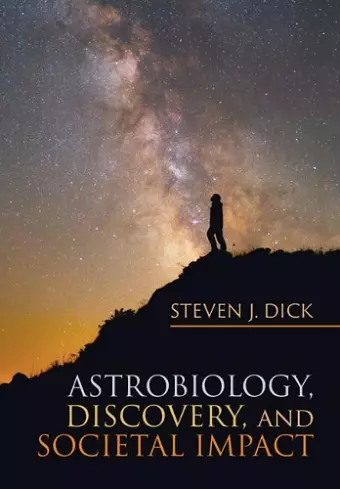Astrobiology, Discovery, and Societal Impact
Format:Hardback
Publisher:Cambridge University Press
Published:3rd May '18
Currently unavailable, and unfortunately no date known when it will be back
This hardback is available in another edition too:
- Paperback£31.00was £31.00(9781108445511)

Examines humanistic aspects of astrobiology, exploring approaches, critical issues, and implications of the discovery of extraterrestrial life.
New discoveries in astrobiology, including thousands of planets around distant stars, have increased the likelihood of finding life beyond Earth. Astronomer and historian Steven J. Dick examines the philosophical, theological, and societal implications of such a discovery. He presents the remarkable and often surprising results in easily accessible language.The search for life in the universe, once the stuff of science fiction, is now a robust worldwide research program with a well-defined roadmap probing both scientific and societal issues. This volume examines the humanistic aspects of astrobiology, systematically discussing the approaches, critical issues, and implications of discovering life beyond Earth. What do the concepts of life and intelligence, culture and civilization, technology and communication mean in a cosmic context? What are the theological and philosophical implications if we find life - and if we do not? Steven J. Dick argues that given recent scientific findings, the discovery of life in some form beyond Earth is likely and so we need to study the possible impacts of such a discovery and formulate policies to deal with them. The remarkable and often surprising results are presented here in a form accessible to disciplines across the sciences, social sciences, and humanities.
'At last, a comprehensive and level-headed analysis of what it means for humanity should we discover alien life - an event that would utterly transform our worldview. Steven J. Dick, the world's foremost scholar in this field, leads us from the lessons of history to the tantalizing promise of astrobiology's emerging technologies. Admirably, he does not shy away from confronting the ethical, societal and theological ramifications that most commentators fudge. This is a 'must-buy' book for anyone who thinks seriously about the age-old question of whether or not we alone in the universe.' Paul Davies, Arizona State University, and author of The Eerie Silence: Are We Alone in the Universe?
'We (primarily the space agencies and the scientific community of Astrobiology) are currently engaged in a grand exploration, seeking life beyond Earth. It is past time that we make plans for what the discovery of distant life - microbial, intelligent, or other - would mean for terrestrial life. What will be the impacts as we destructure one set of world views and restructure another? What do we know about humans and their institutions that will help us plan proactively for a transition to a biological universe, if and when that occurs? What policies must we pre-enact to guide any first contact to an outcome deemed satisfactory by all concerned? These are just some of the questions posed by Steven J. Dick in this scholarly and fascinating book that makes the case for the further inclusion of the humanities and social sciences within Astrobiology. While many of these questions are now unanswerable, this work provides a roadmap for how we might arrive at what is knowable in advance of a discovery.' Jill Tarter, SETI Institute
ISBN: 9781108426763
Dimensions: 253mm x 178mm x 21mm
Weight: 930g
394 pages